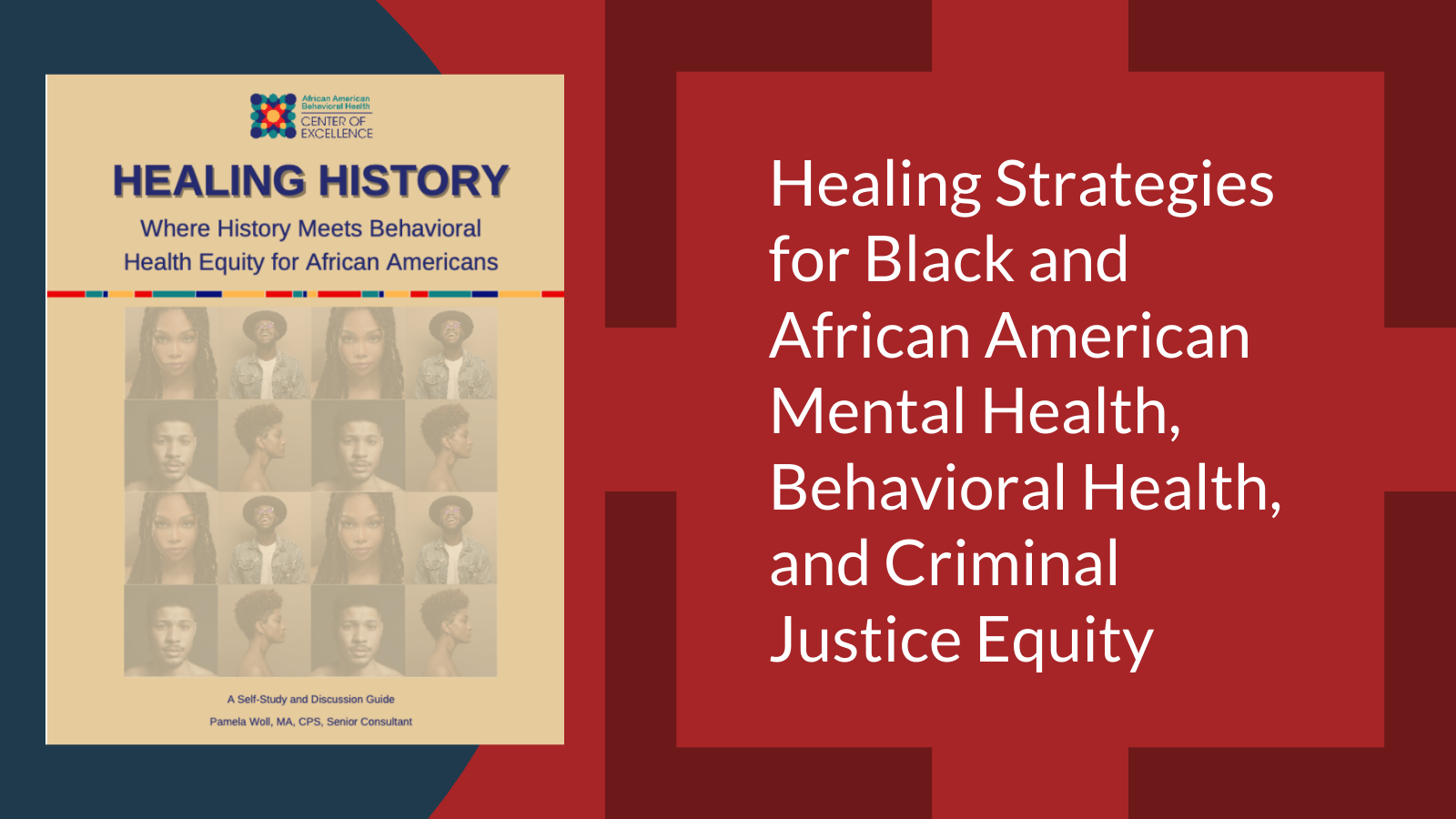In 2020, the Substance Abuse and Mental Health Services Administration (SAMHSA) established the African American Behavioral Health Center of Excellence (AABH-CoE) to transform behavioral health services for Black and African American people and make those services safer, more effective, more accessible, more inclusive, more welcoming, more engaging, and more culturally appropriate and responsive. The AABH-CoE, hosted by the Morehouse School of Medicine, is tasked with providing training and technical assistance to help communities address inequities that disproportionately affect individuals from the Black and African American community, including disparities in mental health, behavioral health, and justice system involvement; unequal access to treatment or culturally competent trauma-informed providers; and overrepresentation of Black Americans in carceral settings and a higher rate of incarceration and harsher sentencing experienced by Black Americans compared to individuals from other racial groups.
In 2021, the AABH-CoE released a self-study and discussion guide for practitioners working in behavioral health services titled Healing History: Where History Meets Behavioral Health Equity for African Americans. This manual is focused on building an understanding of history’s effects on the mental health of Black Americans and the ways in which practitioners’ understanding of history can help them address inequities in the behavioral, physical, and public health and justice systems. In 2022, the center released the first two chapters of the “Healing History” webpage, resources that delve more deeply into history—including African civilizations, slavery’s impact in America, policies and systems, healthcare issues, and the strengths and struggles of African Americans. The AABH-CoE is also hosting its first Healing History learning community in February 2024.
The Healing History series serves as a vital resource for professionals in behavioral health, offering insights and practical guidance to effectively address and reduce the disparities faced by Black and African American people. For this article, we spoke to Dawn Tyus, PhD, LPC, MAC, and Pamela Woll, MA, CPS. Dr. Tyus is an adjunct professor at Morehouse School of Medicine and the principal investigator for the AABH-CoE. Woll, senior consultant to the center, is the author of the Healing History self-study and discussion guide and the architect of and contributor to the Healing History webpage. They shared these additional insights regarding the importance of this work and its continued application in the criminal justice and behavioral health sectors.
Healing History: How History Affects the Present
The legacy of historical events continues to shape the mental health landscape for Black and African American people. According to Dr. Tyus, it is important to understand the social and cultural issues that perpetuate disparities and to delve into the factors that contribute to them, questioning how these elements impact an individual’s mental health experience. She emphasizes the importance of understanding historical contexts to effectively address and mitigate these issues. “Before you can start looking at fixing inequalities, you need to really understand the marginalized group you are speaking of, including their history,” says Dr. Tyus. Underscoring the importance of historical awareness in comprehending current mental health disparities among Black Americans, “Research shows that historical trauma can cause epigenetic changes at the DNA level,” says Woll. These epigenetic changes, as Woll explains, mean that the effects of trauma can be passed down through generations, embedding historical pain into the very fabric of one’s genetic makeup. She goes on to say that “long-term exposure to stress and threat can alter physical and physiological responses and even increase vulnerability to chronic physical and behavioral health conditions.”
Historical experiences of harm resonate in the lives of Black Americans today. These harms include the history and residual impact of slavery, disenfranchisement, and the enforcement of Jim Crow laws, among others, and the loss and betrayal inherent in all of these experiences. The profound impact of history on the mental health of Black Americans can be observed through various indicators, including the enduring effects of historical trauma. Woll describes these as “still-open wounds.” Woll continues, “These historical violations have led to a profound loss of trust, emotional regulation, and sense of connection.” Contemporary instances of police brutality (e.g., excessive use of force) perpetuate the legacy of betrayal and moral injury, and all of these impacts occur in the context of unequal policies and practices in health care and criminal justice.
Healing History: Strategies and Recommendations
Supporting Black Americans in and out of carceral settings who have mental or substance use disorders calls for a multifaceted approach. This involves addressing the trauma associated with justice involvement through historical and systemic perspectives. Empathy, cultural humility, and a strength-based, trauma-informed approach can help alleviate some of the stress and fear many Black Americans—with and without mental and substance use disorders—feel when involved with justice systems. The following are some approaches and practices that mental and behavioral health providers and those in the criminal justice field can consider incorporating into their services when working with Black Americans who become involved or are at risk of becoming involved with the criminal justice system:
- Practice cultural humility.
- Work from an anti-racist, trauma-informed framework.
- Account for the social determinants of health.
- Create space and opportunity for grief work.
Practicing Cultural Humility
Beyond cultural competence, cultural humility is a lifelong commitment to learning, self-critique, and a respectful approach toward an individual’s own cultural identity and experiences. Cultural humility embodies an openness to learning from the person using services about what they value, how they identify, and how their experiences have shaped them through person-centered, respectful, and self-aware provision of services. Communities and their substance use disorder treatment, mental health treatment, and criminal justice partners may benefit from reviewing the Council of State Governments Justice Center’s webinar Aligning Cultural Humility and Trauma-Informed Approaches, which encourages a respectful and individualized understanding of cultural identities.
Working from an Anti-racist, Trauma-Informed Framework
Substance use and mental health treatment services inside and outside of carceral settings can improve services for Black and African American people by considering the historical and systemic barriers they face and call upon practices such as trauma-informed care, cultural responsivity, grounding, and radical healing. It is equally important, notes Woll, that people working with justice-involved Black and African American people address their own trauma and moral injury so as not to further harm the people they are working with. Woll recommends reading My Grandmother’s Hands: Racialized Trauma and the Pathway to Mending Our Hearts and Bodies by Resmaa Menakem. Criminal justice and behavioral health professionals may also be interested in participating in a GAINS Center trauma training for criminal justice professionals, which aims to increase understanding and awareness of the impact of trauma, thus promoting trauma-informed responses to people with behavioral health conditions who come in contact with the justice system.
Accounting for the Social Determinants of Health
Social determinants of health are non-biological factors that affect a person’s health. Racism, discrimination, poverty, and disenfranchisement are social determinants of health associated with higher rates of disease and illness. Thus, incorporating programming that addresses these social determinants of health may help combat some of these poor health effects. Communities may be interested in reviewing SAMHSA’s Strategic Plan: 2023–2026 for insight into national efforts to address social determinants of mental health and behavioral health. In 2022, the AABH-CoE released a resource, Addressing Disparities in Access and Utilization of Mental Health and Substance Use Services among Blacks and African Americans: Solutions from Community Stakeholders, which describes promising practices for addressing disparities among Black people and African Americans with mental and substance use disorder treatment needs.
Creating Space for Grief Work
Present and past experiences of racism can result in feelings of anguish for many Black and African American people, termed collective grief. Creating space to grieve can help individuals process both current and historical losses and the sense of betrayal that comes with historical trauma. “Think of intergenerational or historical losses as one more layer of grief. This layer might take the form of a powerful identification with the losses of earlier generations,” advises Woll in the Healing History self-study guide. Criminal justice and behavioral health community partners can learn more about addressing racism-related grief from the presentation from the New York Office of Behavioral Health, Addressing Community Grief and Trauma Caused by Racism and Violence.
While historical trauma and loss influence the experience of Black and African American people, so too does a long history of resilience, strength, courage, wisdom, and will. A person-centered, strength-based approach can help individuals see their innate strengths. “Empathy and positive regard help build trust and move healing forward,” says Dr. Tyus.
Additional Resources
- SAMHSA African American Behavioral Health Center of Excellence
- SAMHSA Office of Behavioral Health Equity
- National Network to Eliminate Disparities in Behavioral Health
- National Institute of Corrections, “Racial Disparities and Dynamics in the Criminal Justice System“
Like what you’ve read? Sign up to receive the monthly GAINS eNews!




